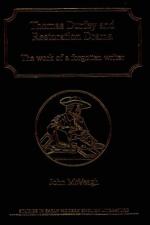|
This section contains 17,471 words (approx. 59 pages at 300 words per page) |

|
SOURCE: Sherbert, Garry. “Metaphysic Wit: The Charm and Riddle of D'Urfey's Menippean Satire. In Menippean Satire and the Poetics of Wit: Ideologies of Self-Consciousness in Dunton, D'Urfey, and Sterne, pp. 76-117. New York: Peter Lang, 1996.
In the following essay, Sherbert discusses the riddles, puns, and other comic techniques Durfey used in his parody of John Norris's An Essay Towards the Theory of the Intelligible World.
Wit's false mirror
—Alexander Pope, Essay on Man
Thomas D'Urfey's contribution to the eighteenth-century battle of wits is his “Satyrical Fable”, An Essay Towards the Theory of the Intelligible World (1707). Against what he calls the “Metaphysick Wit” (14) of John Norris, D'Urfey launches a parody that turns Platonic idealism into the playful nonsense of the senses. To effect his victim's narrative descent, the satirist calls up associations with the story of Echo and Narcissus. Corresponding with these two mythic figures, the satiric reduction of...
|
This section contains 17,471 words (approx. 59 pages at 300 words per page) |

|


